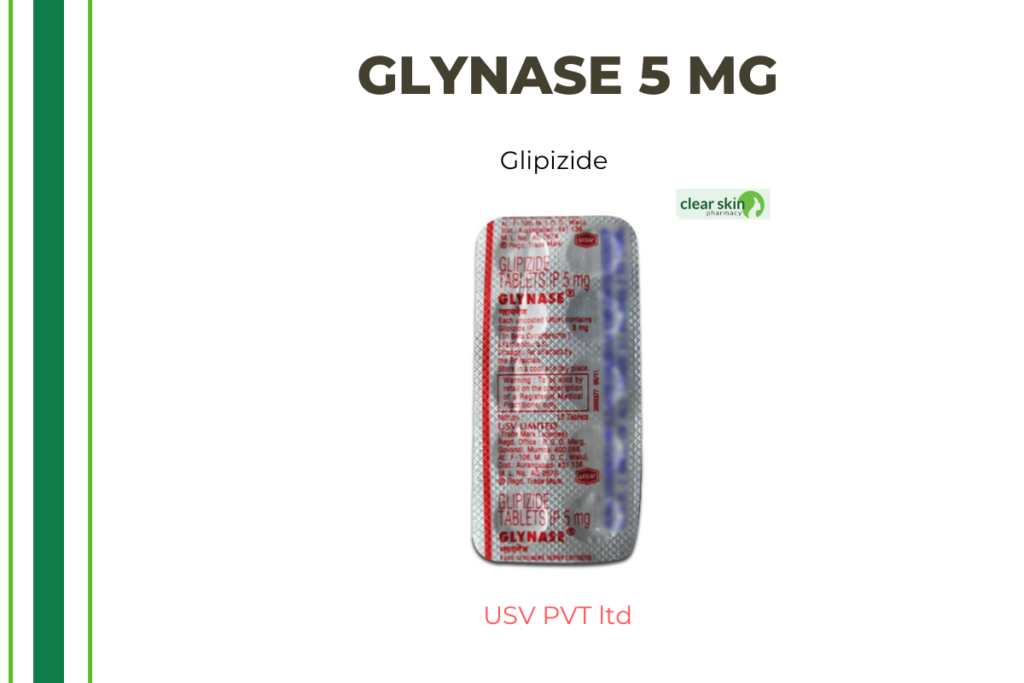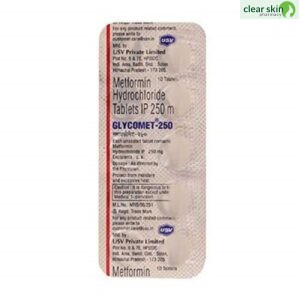Glynase
Glynase belongs to the class of diabetic drugs known as sulfonylureas. It is used to treat diabetes mellitus type 2. Glynase is used to treat people with type 2 diabetes who cannot control their blood sugar levels by diet and exercise alone. Type 2 diabetes mellitus is also known as non-insulin-dependent diabetes. Diabetes is a metabolic condition characterized by unusually high blood glucose levels. Insulin is the hormone responsible for regulating blood glucose levels. Individuals with type 2 diabetes either produce insufficient insulin or insulin does not function correctly in the body (insulin resistance). The risk of developing type 2 diabetes, often known as adult-onset diabetes, increases with age.
Glynase contains the active component Glipizide, which boosts insulin synthesis via increasing insulin release from the pancreas’ beta cells, hence reducing high blood glucose (sugar) levels. Glynase is contraindicated for type 1 diabetic treatment.
Glynase should be taken 30 minutes before food, as it may become ineffective if taken with food. The pill must be consumed whole with a glass of water; it should not be broken, chewed, or crushed. Glynase should be administered daily at the same time. Glynase should not be taken unless prescribed by a physician. Your doctor will determine the duration of Glynase use based on your medical condition. Hypoglycemia (low blood glucose levels), nausea, diarrhoea, and stomach pain are unpleasant consequences that may develop under certain conditions. The majority of these side effects are transient and will go on their own. However, it is advised that you consult a physician if you continue to have bad effects.
Glynase is unsuccessful in the management of severe hyperglycemia in patients with type 1 diabetes (high blood glucose levels). To effectively treat your condition, continue taking Glynase for as long as your doctor prescribes. Please avoid skipping doses or abruptly discontinuing Glynase without first seeing your doctor, since this may lead to high blood glucose levels. If you are pregnant or breastfeeding, use Glynase with caution. Glynase should not be administered to children. While using Glynase, avoid consuming alcoholic beverages, as they may worsen bad effects. Because glynase may cause dizziness and sleepiness, only operate a motor vehicle when you are fully alert. Inform your doctor of the medications you are already taking and your current health status in order to rule out the possibility of adverse side effects.
Applications of Glynase Type 2 diabetic ketoacidosis

Medicinal Advantages
Glynase belongs to the class of diabetic drugs known as sulfonylureas. It is used to treat diabetes mellitus type 2. Glynase is used to treat people with type 2 diabetes who cannot control their blood sugar levels by diet and exercise alone. Glynase functions by increasing insulin release from the beta cells of the pancreas, hence decreasing blood glucose (sugar) levels.
Use Instructions
Glynase should be taken 30 minutes before food, as it may become ineffective if taken with food. The pill must be consumed whole with a glass of water; it should not be broken, chewed, or crushed. Glynase should be administered daily at the same time. Glynase should not be taken unless prescribed by a physician. The duration of your Glynase treatment will be determined by your physician based on your medical condition.
Storage Avoid direct sunlight and store in a cool, dry spot.
Glynase Adverse Reactions
As with many medications, Glynase may cause side effects, but not everyone will experience them. Hypoglycemia (low blood glucose levels), nausea, diarrhea, and abdominal pain are typically associated with Glynase use. Consult your physician if any of these side effects continue to occur.
Adverse Drug Reactions
Glipizide is unsuccessful in the treatment of people with type 1 diabetes and severe hyperglycemia (high blood glucose levels). Glipizide may increase the risk of heart attack or stroke in patients with existing cardiovascular disease. Do not take Glipizide if you are allergic to any of its components. Glipizide should be taken with caution in patients with renal or hepatic disease. To properly treat your disease, continue taking Glipizide for as long as your doctor directs. Please avoid skipping doses or abruptly discontinuing Glipizide without first seeing your doctor, since this may lead to high blood glucose levels. Use Glipizide with caution during pregnancy and nursing. glipizide should not be administered to children. While using Glipizide, avoid consuming alcoholic beverages as they may increase negative effects. When combined with other medications such as NSAIDs, antibiotics, sulfonamides, probenecid, warfarin, monoamine oxidase inhibitors, quinolones, and beta-adrenergic blocking agents, Glipizide’s effect may be amplified; in such cases, regular monitoring for hypoglycemia (low blood sugar readings) is advised.
Interactions Between Drugs
INTERACTIONS BETWEEN DRUG CLASSES: Aspirin and ibuprofen (pain medications), sitagliptin, canagliflozin, metformin, dulaglutide, liraglutide, and insulin glargine (hyperglycemia medications), furosemide (edema medication), metoprolol (hypertension medication), levothyroxine (hyperthyroidism medication), and warfarin (anticoagulant medication) might interact with Glipizi (used to prevent blood clots).
INTERACTIONS BETWEEN FOOD AND MEDICINE: Alcohol consumption should be avoided when taking Glipizide, as it can cause undesirable side effects.
Glipizide may interact with cardiac disease, hypoglycemia, gastrointestinal stenosis, diabetic ketoacidosis (abnormal accumulation of acids in the blood), glucose-6-phosphate dehydrogenase (G6PD) deficiency, hyponatremia (low salt levels), and renal and liver diseases.
Safety Recommendations
ALCOHOL
It is recommended that you abstain from alcohol while taking Glipizide to avoid unpleasant side effects.
PREGNANCY
If you are pregnant, do not use Glipizide. Your doctor may decide to switch you to insulin shots during your pregnancy. Glipizide is not recommended in the last month of pregnancy.
BREAST FEEDING
Breastfeeding mothers should use Glipizide with caution. Glipizide may be absorbed into breast milk and cause harm to the infant.
DRIVING
Glipizide may cause dizziness and sleepiness; therefore, use caution when driving or using heavy machinery
LIVER
A dose adjustment may be necessary. Glipizide should be administered with caution to patients with liver disease or impairment. Consult your doctor if you have a liver condition or if you have any questions about this.
KIDNEY
A dose adjustment may be necessary. Glipizide should be administered with caution to patients with renal illness or impairment. Consult your doctor if you have kidney disease or if you have any questions about this.
Advice on Diet and Lifestyle
Consume carbohydrates and fiber-rich foods, such as fruits, whole grains, and vegetables.
Consume food at consistent intervals. Avoid skipping meals. Moreover, avoid overeating.
Complement your Glipizide treatment with a nutritious diet and at least 45 minutes of daily walking.
Regular exercise will help you maintain a healthy weight.
Maintain restful sleep and avoid stress with meditation and yoga.
Special Guidance
Glipizide should be taken 30 minutes before a meal, as taking it with food may render it ineffective.
Regular monitoring of blood glucose levels and the H1B1AC test (every three months) is required when using Glipizide.
Avoid skipping any doses and continue taking Glipizide for as long as your doctor prescribes.
Additionally, this item is non-returnable.
Concern for Patients
Diabetes mellitus type 2, also known as non-insulin-dependent diabetes, is a chronic disease in which the body is unable to utilize insulin effectively. Diabetes is a metabolic condition characterized by unusually high blood glucose levels. Insulin is the hormone responsible for regulating blood glucose levels. Individuals with type 2 diabetes either do not produce enough insulin or the insulin they do produce is inefficient (insulin resistance). People in their middle years or older have the highest risk of developing type 2 diabetes, often known as adult-onset diabetes. Type 2 diabetes is characterized by a lack of energy, weariness, frequent urination, excessive thirst, dry mouth, impaired vision, persistent hunger, weight loss, and itchy skin.
FAQs
Glipizide reduces blood glucose (sugar) levels by stimulating insulin release from beta cells in the pancreas.
Occasionally, Glipizide may cause blood glucose levels to drop below normal, leading to hypoglycemia. Check your blood sugar often when using Glipizide. Hypoglycemia is characterized by a headache, dizziness, fatigue, shakiness, faintness, confusion, and vision problems.
Hypoglycemia may happen from prolonged or vigorous exercise, illness, alcohol consumption, a low-calorie diet, or the combination of Glipizide with another anti-diabetic drug.
Maintain a healthy diet by regularly ingesting carbohydrates such as bread and other products containing starch and sugar. Consume food on a regular basis and avoid engaging in prolonged strenuous exercise on an empty stomach. If you notice symptoms of low blood sugar, such as intense hunger, sweating, exhaustion, dizziness, feeling hungry, feeling shaky, or a quick heartbeat, ingest sugar candies immediately. This will result in an increase in your blood sugar level and a return to normal sensation.
Glipizide is used to treat either permanent or chronic diabetes. Therefore, do not abruptly stop taking Glipizide without consulting your doctor, as doing so may cause a spike in blood glucose levels. Continue taking Glipizide for as long as prescribed by your doctor. Do not hesitate to contact your doctor if you have any side effects while taking Glipizide.
Avoid consuming alcohol while taking Glipizide, as it may increase the drug’s side effects.
If you are scheduled for a major operation or have recently been diagnosed with a severe infection or illness, your diabetic care may be impaired. Consult your physician if you have any concerns; your physician may choose to temporarily replace Glipizide with insulin in order to control your blood glucose levels.
Occasionally, Glipizide may affect laboratory test results. Inform the person administering the test that you are taking Glipizide.
If you have diabetic ketoacidosis (too many acids in the blood) or if you have ever had an adverse reaction to glipizide, you should not take it.






Be the first to review “GLYNASE 5 MG 10 tablets”